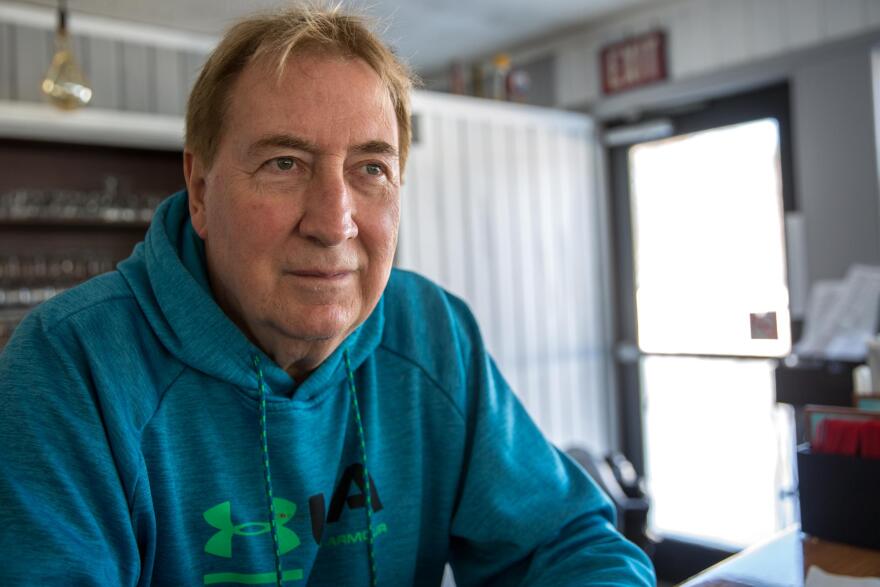If you log onto some overseas website to bet on sports, or you do it through a bookie at the local bar, or even if you and your buddy have $20 riding on the Giants/Cowboys game, you’re betting illegally.
Hundreds of billions of dollars are bet illegally on sports every year in the United States. Not surprisingly, the exact number is hard to track down. Still, as Connecticut lawmakers ponder bills to legalize sports betting this legislative session, capturing some of that revenue stream is a motivating factor.
Local radio personality Joseph Schlosser used to be a morning talk show host known as “Sebastian” on The Rock 106.9 (WCCC-FM). He's also a handicapper at Sebastiansports.com – meaning people go to him for betting advice.
In 2010, he and about a dozen others were arrested on illegal gambling charges for betting through a bookmaker named Paul Graziano.
“I guess local bookies get customers through referrals and who do you know,” Sebastian said. “Somebody that had bought my sports picks at one time – I guess was making bets with him – asked me if I wanted to put bets in through him and I said sure.”
Sebastian said his punishment was accelerated rehabilitation and a small fine.
When you add up the total bets he made through the bookmaker, his handle -- the total amount of wagers in a given account -- was something like $300,000. But Sebastian doesn’t think he should have been arrested for it.
“I’ve been called by media people, friends, relatives -- everybody I know that’s ever placed a bet -- and they were just beyond words as to how they could arrest somebody for making a bet,” he said
Last May, the Supreme Court overturned a federal law that made sports betting illegal outside of Nevada, but left it up to the states as to what to do next. Since then, seven states including Rhode Island have legalized it. Most experts expect that to make a dent in the illegal market and Sebastian agrees.
“Any state that’s complaining that they’re in the red -- I still don’t know why they’re taking so much time to work this out because there’s a definite market for this,” he said. “It would take the place of tolls. It would take the place of other taxes.”
Bookies will still let some people bet on credit and not everyone wants to wait in line at a casino, so the illegal market likely won’t die off.
State police in Rhode Island, who run periodic wire taps to investigate criminal gambling, have said that since sports betting was legalized in that state, no arrests have been made related to illegal bookmaking. But police Lt. Cmdr. Joseph Philbin said a couple of things may be going on here.
“Special investigations unit will always keep an eye on subjects that are known to do this and frequent these establishments and commit these type of crimes,” Lt. Cmdr. Philbin said. “When it becomes legal, it’s a tougher sell to the people committing the resources and doing these big cases. We’re always going to do them – if they come our way -- and we’re going to keep an eye on people. But, legalizing it – I would imagine is going to put a dent into it.”
The American Gaming Association has lobbied for the legalization of sports betting on behalf of casinos like Twin River in Rhode Island. The AGA also has a sense of the size of the market. The association’s research indicates that about $6 billion was bet on the outcome of this year's Super Bowl. And 97 percent of those bets were made illegally.
Dave Forman, the AGA’s senior director of research, said that another part of the reason why states want to bring sports betting “out of the shadows” is so that customers don’t have to worry about being paid out on their winnings.
“The problem with that, especially the bookies and the online sites, is that there’s no consumer protection for these folks, no assurance that their bet is going to be paid by some of these shady operators,” Forman said.
As Connecticut’s legislature takes up bills related to sports betting, they are thinking about how to police the market, but they’re really driven by the money. State Rep. Joe Verrengia, (D-West Hartford), is helping determine best practice for sports betting, including what to tax would-be sports book operators. He said he recognizes both the opportunity and the difficulty of going up against a flourishing black market.
“I think it’s important that you have a reasonable tax rate because the reality is we’re competing with the underground so it’s important that we don’t have these astronomical rates or astronomical fees,” Verrengia said.
The bills were recently discussed in a public hearing at Hartford’s Legislative Office Building.
“The illegal market exists -- estimates range but a number that people have seemed to migrate towards is a $150 billion underground industry,” said Chris Cipolla, an executive for the online daily fantasy sports giant Draftkings who showed up to testify at the hearing. “We view it as how do you move that money into the regulated space, and that goes back to making it convenient enough for people to move into the regulated space.”
Draftkings' answer to convenience is mobile: being able to place a bet not by traveling to a casino, but right on the device that’s always in your pocket. The company currently hosts a mobile platform in the legalized sports betting state of New Jersey. That’s something Cipolla and his colleagues want Connecticut lawmakers to get in on.
It’s an alternative to offshore gaming – where many people now go to bet online illegally. But with the promise of convenience in mobile betting, comes a problem -- the threat of addiction. That’s what we’ll explore in the next in our series on sports betting.





